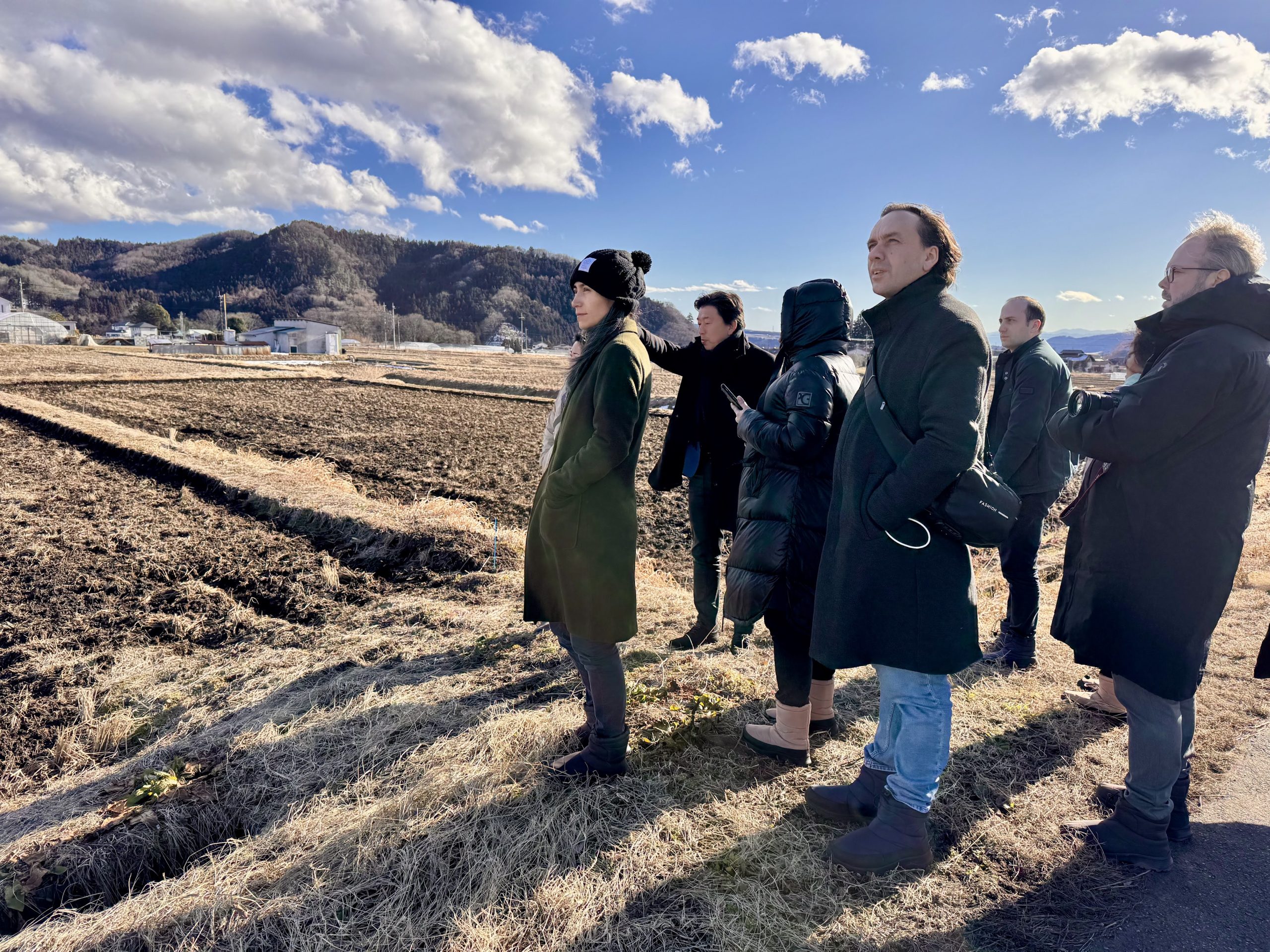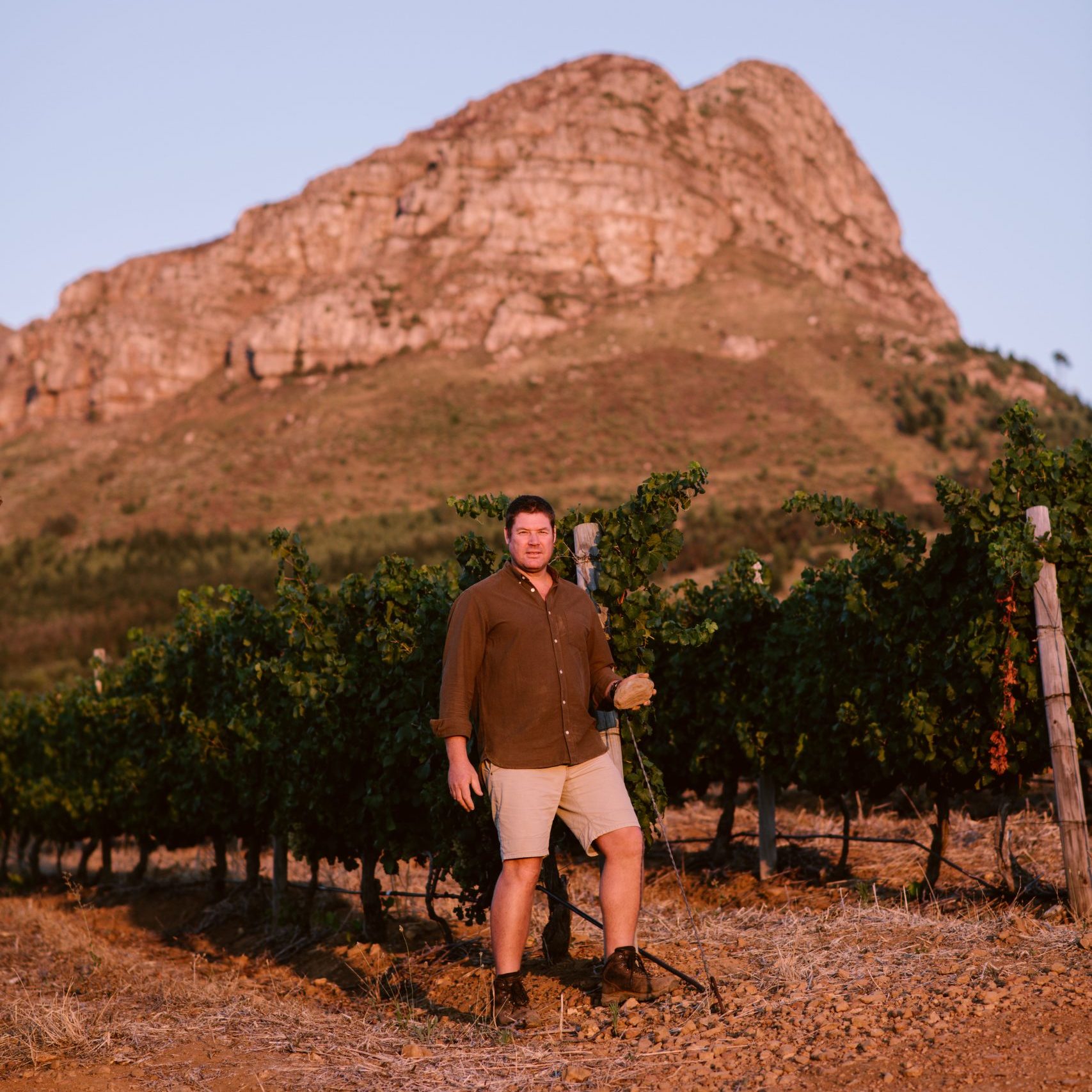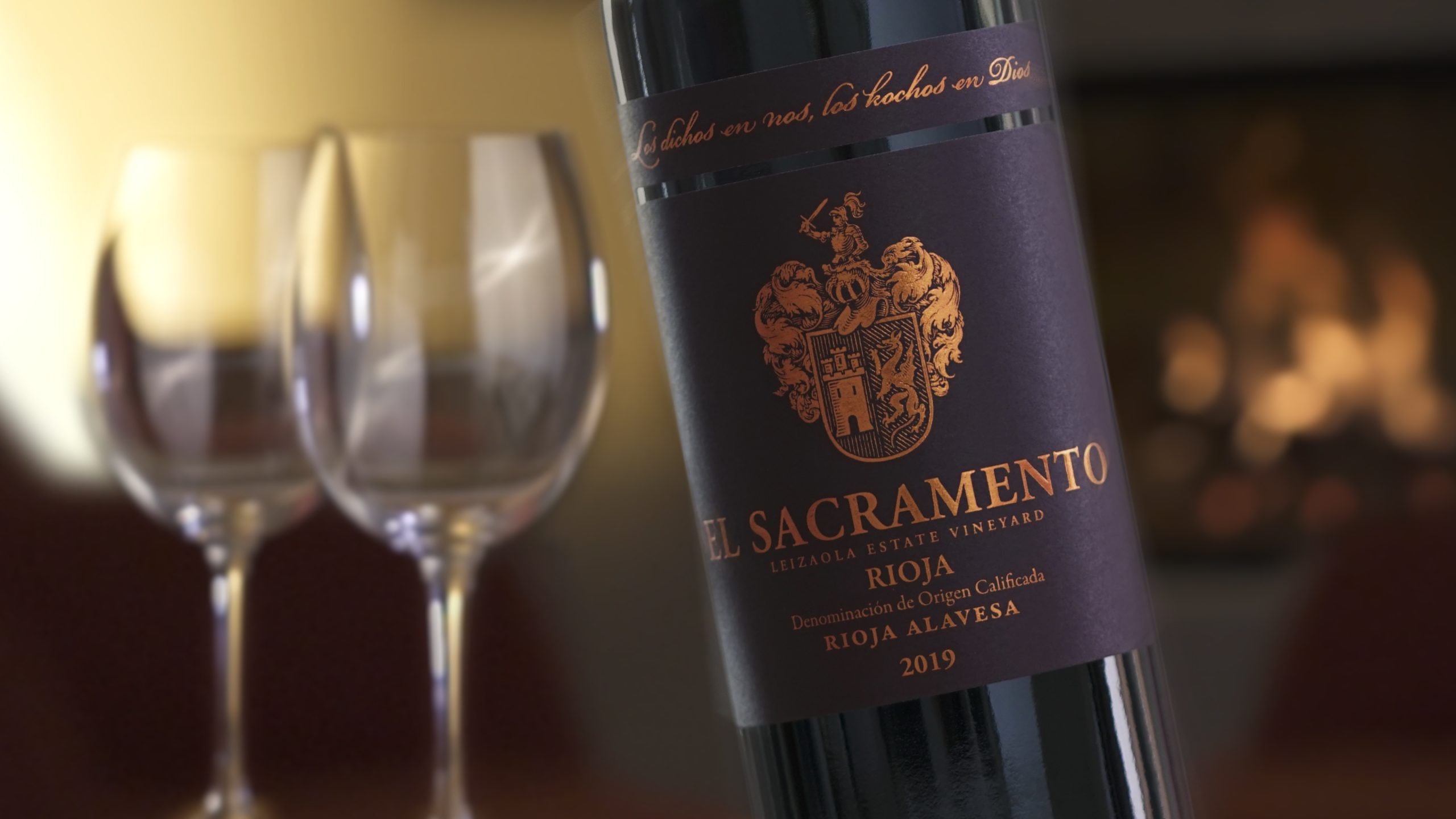db Eats: Ristorante Opera, Turin
By Louis ThomasLouis Thomas faces the music at Turin’s Ristorante Opera and tests whether its signature tasting menu is a triumph or a tragedy.
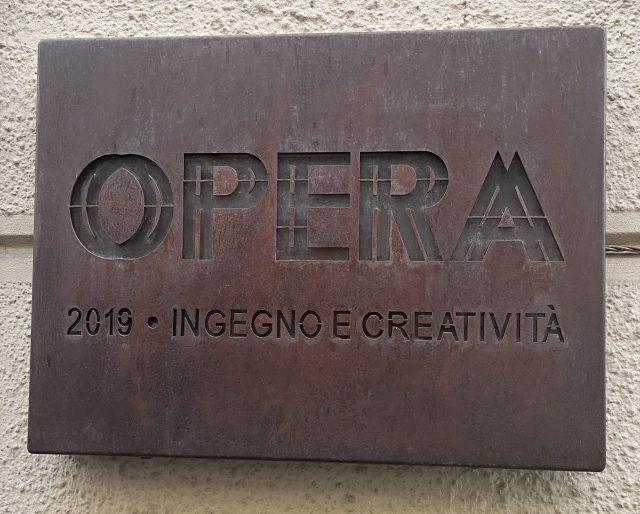
Ristorante Opera came to my attention from the recommendation of a friend who noted that when he dined there with his family, the staff asked if anyone was left-handed and upon hearing that his daughter was, they promptly rearranged the cutlery and glasses to accommodate her southpaw preference.
As someone who also leans towards the sinister side, and who all too often must undergo the labour of dragging my glass over the foot long distance across the table cloth in order for it to be in the right (left) place for me, I am naturally eager to put this to the test – for too long we lefties have been left behind. Within minutes of my arrival in the brick dining room, which has the appearance of being inside a palatial pizza oven, but, thankfully, a much fresher temperature, they ask me the exact same question.
I must confess that on that particular evening, I was not necessarily in the mood for all the primping and preening that comes with this kind of dining – a similar feeling to that I have in the hours before I go to the opera, knowing I will be seated for at least three hours and sensorially bombarded with high culture. However, much like my visits to the ROH, I felt all the better for going as things progressed. To paraphrase Don Giovanni, “I’ll be damned” – it largely won me over.
Indeed, as far as music is concerned, Ristorante Opera gets full marks. A playlist including Fats Waller, Frank Sinatra, Perry Como, Dean Martin, Nat King Cole, Tony Bennett is eerily similar to my own Spotify listening, and therefore, naturally, an ideal accompaniment.
A welcome drink of green tea kombucha is followed by a slightly harder drink in the form of a glass of Marcalberto Alta Langa blanc de blancs chosen from the ‘welcome list’ – three paper pages of aperitivi options enclosed within somewhat cumbersome wooden covers. To accompany, crispy chickpea flour wafers – think panelle meets Mr. Whippy.
I opt for the ‘Opera’ tasting menu (€110), though the vegetarian ‘Fabaceae’ tasting menu also intrigues. As for drinks, there are two wine options: Act I – €70 for five glasses, or Act II – an eye-watering €140 for six glasses of more premium wines, both international and Italian. There is also the option of a tea pairing for €50. Naturally, I choose the Act I, both because I did not come to Piemonte to drink non-Italian wines, and because I have to budget at some point.
The theatrics of the tasting menu commence with a series of “welcome snacks”, including a Fabergé egg-like creation brimming with zucchini purée and a Ligurian black olive tapenade encased within a white chocolate shell. The latter, though bizarre, is a wonderful agrodolce punch that nicely complements the Buvoli Metodo Classico blanc de noirs it is served alongside.
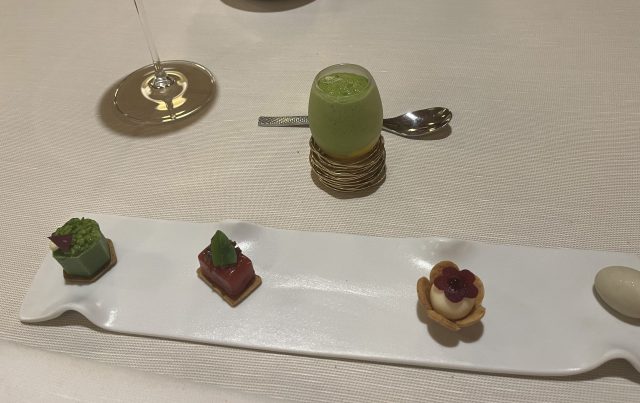
Snacks dispatched with, the first of the starters arrives, a carrot cooked in orange juice with galangal, accompanied by a luminous cocktail, prepared table-side, made using the same ingredients. I’m not sure why carrots and oranges go so well together, maybe it’s just the colour, but the dish was a brilliant demonstration that root vegetables needn’t be dour.
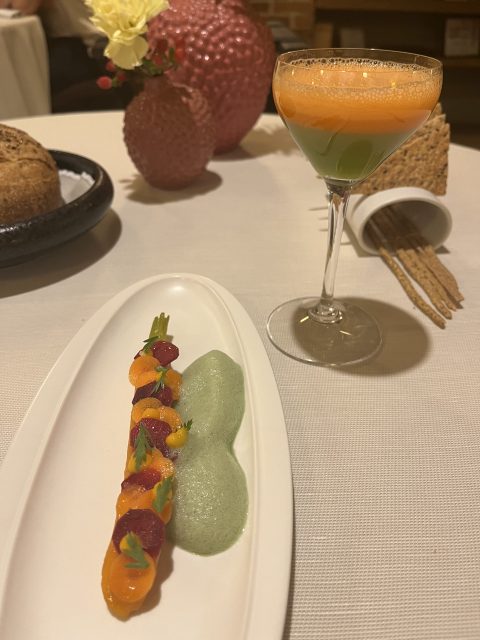
The next wine arrives – Fol, a dry Moscato. Sommelier Carlo Solino explains to me that the name, meaning ‘crazy’ in Piemontese dialect, is a reference to how winemaker Ezio Cerruti opted to make a dry expression of the variety rather than a sweet one. “There is an incoherence between the nose and the mouth,” Solino explains. Indeed, to me it is reminiscent of the dry Zibibbo wines of Western Sicily (which makes sense given that Zibibbo is part of the Muscat family). Whether Cerruti the man is actually crazy or not is none of my business, but as a winemaker he possesses prophetic clarity.
Admittedly, given the carrot came with its own cocktail, this aromatic tipple was not necessarily in the limelight, but it plays nicely with the galangal the carrot was cooked with. It does prove to be an excellent companion to the next course – spiralised potato, with a pleasing al dente crunch, and mussels, and some splodges of Peruvian purple potato. The tactical use of kombu and mussel brine results in something salty, savoury, and rather delicious, and the mussels themselves have a sea urchin-like intensity.
The third and final starter, a glazed sweetbread served with a morels and a touch of sherry, proves to be my favourite course of the night. I’m an unashamed gland fan, in a gastronomic sense, and the sticky, glossy glaze on the sweetbread lends a teriyaki-esque smoky, salty, sweet intensity that is sensationally good.
Echoing the waiter from my visit to Ristorante Consorzio a few days prior, Solino says for his wine choice: “You are in the region, it has to be Barolo” – in this case, Ettore Germano Barolo Prapò.
“2018 was an interesting vintage,” Solino explains, “because the wines are much readier to drink when young, but are maybe less age-worthy.”
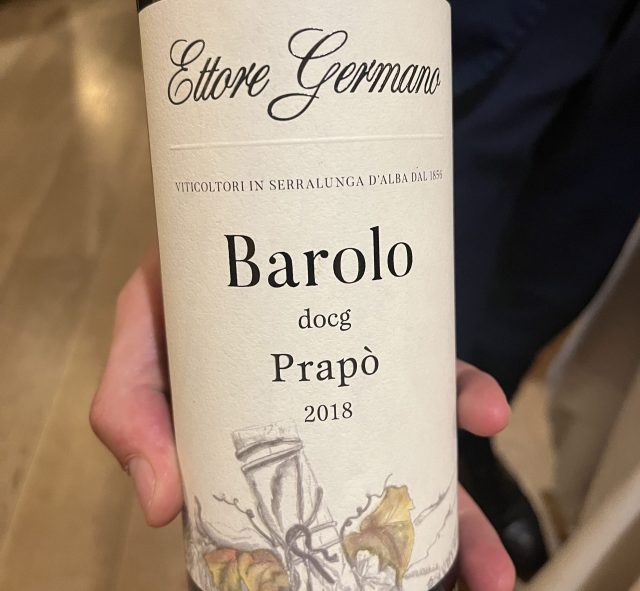
I feel as if I’ve caught this particular bottle at a good moment – its tannins give it a feistiness, but in a charming rather than particular annoying way, like a younger cousin that you seldom see.
Partner Content
In the interval between primi and secondi, I realise that this may well be the perfect restaurant for indulgent solo dining. It’s a topic that has been hotly debated in London after the Alex Dilling furore, but given that so much of Opera is about presenting to the diner, a companion might only be a distraction. Indeed, even the other tables, occupied by couples, are arranged in such a way so as the guests don’t even have to look at one another.
Defying the convention of pasta being for primo, the next two courses are centred around the starch.
An exquisitely plated riff on pasta e fagioli, with discs of bean flour dough atop a bed of beans, with some pearls of crispy beans within for added texture. The addition of pear adds a sweetness while tarragon lends its distinct aniseed fragrance, lifting the whole dish from comfortingly savoury to be something else altogether, and the Barolo proves to be a solid match for this, though perhaps not as perfect a pairing as it was with the sweetbread.
The next wine pips the next pasta to the post – a Fanta-hued orange wine from Paraschos. While the winery is based in the outskirts of the Friulano town of Gorizia, the vines from which the Friulano, Ribolla Gialla and Malvasia grapes for the blend were sourced are just over the border in Slovenia. It has just the right amount of ‘natural funk’ on the nose and slickness from the skin contact to make it worthwhile as an orange wine without being unpleasantly so.
Pasta number two slithers over – a perfect cylinder of spaghetti doused in a bright green coriander pesto on a bed of sea snail with a frothy sea snail sauce poured around it as it arrives. Others may be squeamish about the amount of mollusc in this dish, but given that polystyrene cups full of whelks were a fixture of the seaside holidays of my childhood, there is a strange nostalgia to this plate for me. I do feel that another glass of the Fol may be preferable as a pairing, but the orange wine’s resinous note is interesting with the coriander. And for those who quibble about the ‘non-traditional’ idea of using coriander in pesto – basil originates from South Asia, and yet the Genoese have made it the star of their namesake pasta sauce.
Though Ristorante Opera may be too high end for utilising the whole loaf of bread I was given to mop up the sauce, I proceed nonetheless.
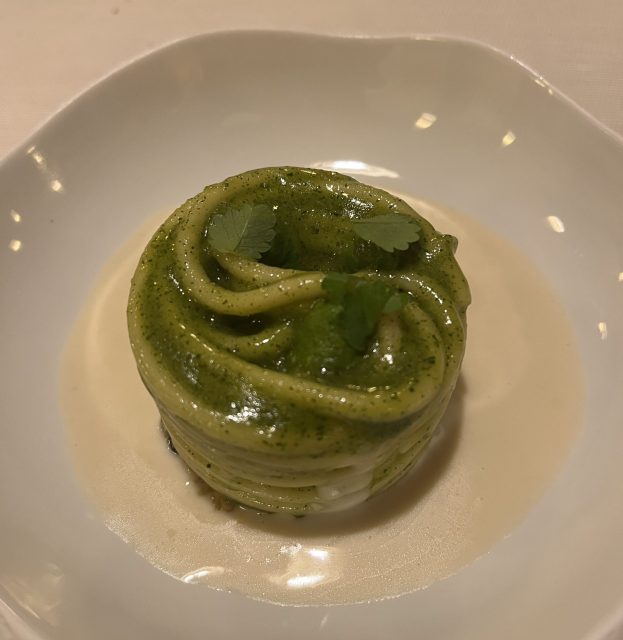
Before the final savoury course, a bowl of cucumber water in which a beetroot jewel wrapped in salted watermelon is presented. While I admit that it doesn’t change my personal neutrality towards cucumbers and watermelons, it plays its palate cleansing part well.
A plethora of bits of pigeon, including a sous vide leg, complete with foil shinguard, grilled breast, and raw breast with panko breadcrumbs, completes the secondo stage. The Berber-style curry and banana, both cooked and dried, do indeed take it to a new place, but one which I am not especially fussed about visiting again. The accompanying Dornach Patrick Uccelli 31, a 2020 vintage Pinot Nero from Alto Adige, proves more compelling, inviting much twiddling of the glass as I enter the pre-finale doldrums.
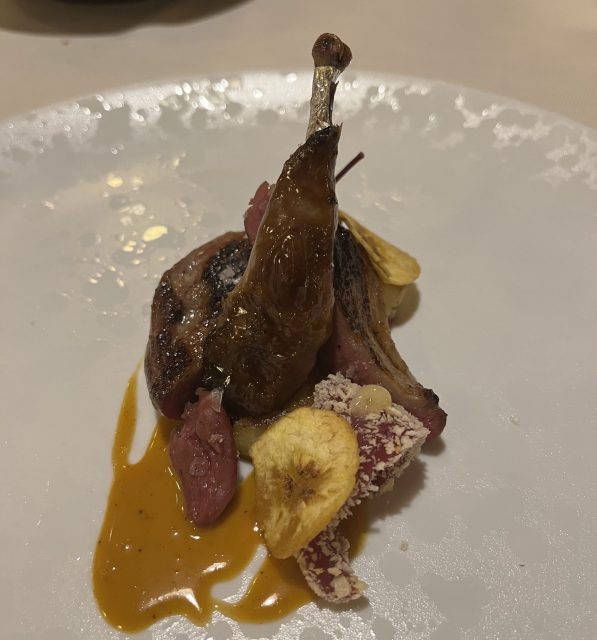
When I visited Bologna’s I Portici, the only restaurant in the city to hold a coveted Michelin Star, I complained of there only be three wines to pair with five dishes, an imbalance which meant that some wines worked well with some courses but fell flat with others. Ristorante Opera gets away with having fewer wines. Whereas the wines at I Portici did not bridge the gaps between plates, those at Ristorante Opera did – each act flowed into the next.
But with dessert it was not a wine that was selected, but a sake, Tsuru-Ume, flavoured with yuzu. It has juicy acidity and a pithy bitterness, though isn’t necessarily to my palate, but I nevertheless appreciate that it is something I might not have otherwise tried.
The dessert itself, called simply ‘Opera’, consist of melon sorbet, tapioca cooked in macadamia water and a macadamia nut biscuit reminiscent of hard tack. Pleasant, though of all the dishes, I don’t think it is the one that deserves the restaurant’s name.
My chief criticism of the tasting menu at Ristorante Opera is the same as my gripe with Mozart’s Così fan tutte, and probably a charge that will be levelled against this review: it doesn’t know when to end. No sooner is my dessert taken away then I am presented with a staircase of final morsels, including a yoghurt tart, apricot jelly and a lemongrass shot. At this point in the dinner, it is perhaps overkill – as is the gift of a copy of the menu complete with a wax seal.
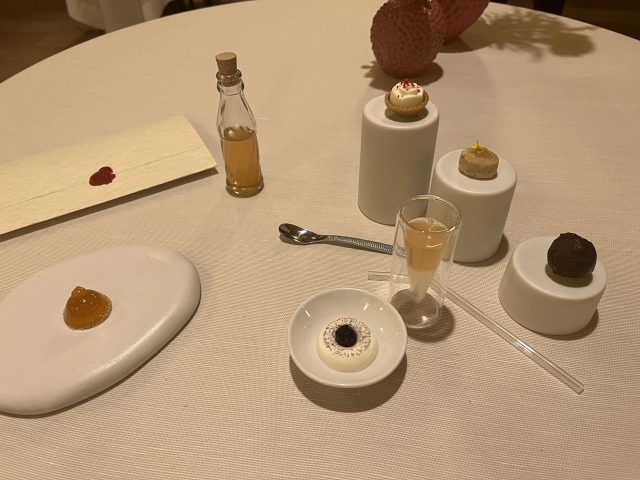
After three hours, about as long as The Barber of Seville, minus the interval, or a sixth of Wagner’s Ring cycle, I settle my bill and depart full of sea snail and sweetbread.
Costing €190 all-in-all (with the coperto), it is certainly not one of the more economical options in the city, but I can honestly say it was worth the financial blow. If I’m going to pay that kind of money, I want the spectacle, the theatre, the sense of ceremony. It is widely accepted, even among leading academics on the subject, that every opera worth its salt has a boring bit, or several in some cases. Ristorante Opera had its lulls, but I can say that, though fatigue set in at the end, I was never bored, and even in those rare moments when there was nothing to eat in front of me, what was in my glass kept me entertained.
Given that the opera season at Turin’s Teatro Regio is yet to kickoff, Ristorante Opera is, on the whole, a worthy substitute – though it might be some time before I can afford the encore.
Related news
Seven talking points from Vinitaly 2025 (apart from tariffs)
Why is volcanic wine getting people so hot under the collar?


